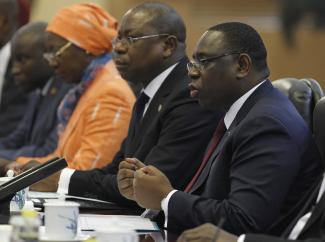Governance
Mixed picture

A study published by the World Bank in the late 1980s argued that there was an Africa-wide lack of good governance and democracy. It considered these issues to be the main reason for slow development. African leaders have been expressing ambitions to overcome these shortcomings since the 1990s. Gedion G. Jalata from the South African Institute of International Affairs writes in a recently published study that governance has improved noticeably the past two decades. There are more political parties; the freedom of speech has been strengthened, and the media landscape has become more diversified. Nonetheless, much remains to be done.
Efforts to improve governments and fully establish democracy are ongoing, but the degree of success differs from country to country, as Jalata acknowledges. While countries like South Africa and Ghana have a record of remarkable progress in areas like public transparency and accountability, separation of powers, control of corruption and broad-based participation in decision-making, most other African countries are not living up to the expectations, according to Jalata.
Jalata states that most African countries are still struggling to enforce democratic standards, have not empowered democratic parties and have yet to abolish authoritarian mechanisms. Corruption rates are high, and human-rights violations are increasingly frequent. Some countries, like Gambia and the Republic of Congo, are still run by autocratic regimes.
Jalata lists the following reasons for slow progress on governance:
- Lack of transparency and accountability: the conduct of government officials tends to be guided more by political, ethnic and social concerns than by professionalism.
- Deficient rule of law: most African constitutions enshrine human rights and other fundamental rights, but implementation remains poor.
- Bribes and patronage: corruption destroys trust in the government and undermines the functioning of the state. According to the African Development Bank, corruption costs Africa more than 148 billion dollar per annum. That sum amounts to about 25 % of continent’s annual gross domestic product.
- The marginalisation of women: even though there has been progress, and women are now members of many African parliaments, there is still no equality of opportunity.
- Election rigging: free and fair polls are not common in many African countries. Leading politicians have been voted out of office in countries like South Africa, Ghana or Botswana, but manipulated elections are typical of many others. Elections are thus more likely to trigger conflicts than to solve problems.
According to Jalata, the African Union has made relevant efforts to improve the overall situation. Since its founding in 2002, it has been using several instruments designed to improve governance. The most important ones, in Jalata’s view, are the African Peer Mechanism, the African Union Convention on Preventing and Combating Corruption (AUCPCC) and the African Charter on Democracy, Elections and Governance.
Other mechanisms are similarly designed to strengthen cooperation among African countries and help Africa acquire a strong and united voice in the international arena. Jalata emphasises the significance of pan-African institutions like the African Court of Justice, the Pan-African Parliament and regional economic organisations. These institutions, he argues, are needed to promote democracy and create an Africa which can interact on an equal footing with other world regions. What Jalata does not discuss, however, is why the Panafrican mechanisms have not stopped the negative trends he observes.
Christina Stobwasser







